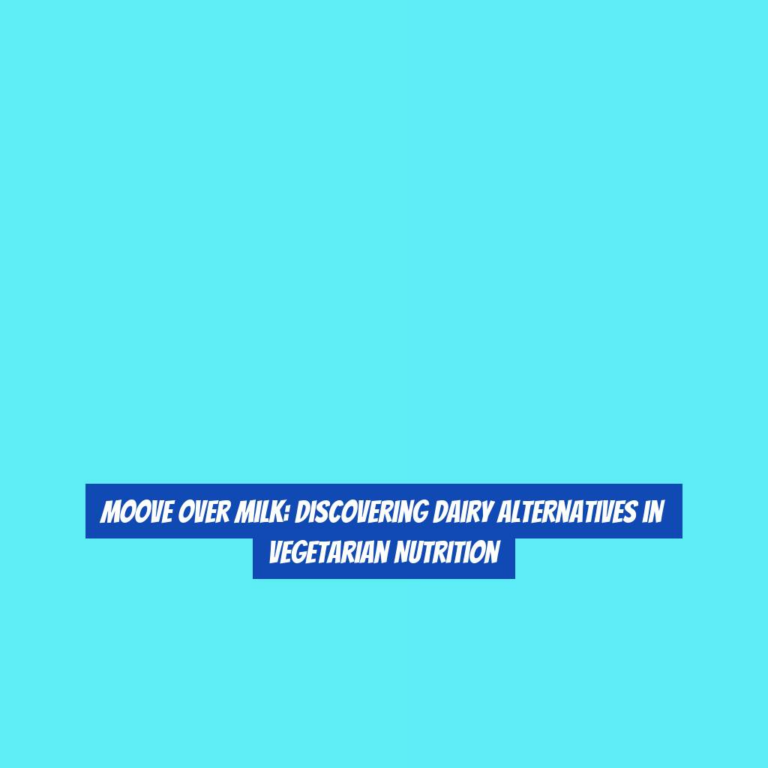LactoseFree Living: Embracing Dairy Alternatives on a Vegetarian Journey
As you navigate the path of vegetarianism, you may find yourself encountering a dairy dilemma. The journey to lactose-free living is not without its challenges, but fear not – there is a world of dairy alternatives waiting to be discovered.
From creamy nut milks to tangy yogurt substitutes and even melty plant-based cheeses, the options are plentiful. But how do you navigate this world of dairy-free possibilities, and where do you begin?
ItG??s time to uncover the secrets of embracing dairy alternatives on your vegetarian journey and discover the delicious and nourishing options that await you.
Understanding Lactose Intolerance
Understanding lactose intolerance can be crucial for making informed dietary choices on your vegetarian journey. Lactose intolerance occurs when your body has difficulty digesting lactose, the sugar found in dairy products. Symptoms such as bloating, gas, and stomach cramps can occur after consuming dairy. ItG??s important to note that lactose intolerance isnG??t the same as a milk allergy, which is a reaction to the proteins in milk. If you suspect youG??re lactose intolerant, itG??s advisable to consult a healthcare professional for proper diagnosis.
When navigating a vegetarian lifestyle with lactose intolerance, itG??s essential to find suitable dairy alternatives that provide the necessary nutrients. Fortunately, there are numerous options available, including almond milk, soy milk, and oat milk. These alternatives are fortified with calcium and vitamin D, which are essential nutrients found in dairy. Additionally, you can explore lactose-free versions of cheese and yogurt, which can be used in various vegetarian recipes.
Exploring Dairy-Free Milk Options
Explore a variety of dairy-free milk options to find the best alternative for your vegetarian lifestyle. There are numerous dairy-free milk options available that can be used as substitutes for traditional cowG??s milk. Here are some popular dairy-free milk options to consider:
-
Almond Milk: This nut-based milk is low in calories and can be a good source of vitamin E and calcium, making it a great option for those who are watching their calorie intake.
-
Soy Milk: Made from soybeans, soy milk is a good source of protein and can provide essential nutrients such as vitamin D and calcium. It has a creamy texture and is a versatile option for cooking and baking.
-
Coconut Milk: With its rich and creamy texture, coconut milk adds a unique flavor to dishes. It contains medium-chain triglycerides (MCTs) which are believed to have various health benefits.
-
Oat Milk: Oat milk is naturally sweet and has a mild flavor, making it a popular choice for coffee and cereal. ItG??s also a good source of fiber and can be fortified with vitamins and minerals.
Exploring these dairy-free milk options can help you find the perfect alternative that suits your taste preferences and nutritional needs.
Incorporating Plant-Based Cheese Alternatives
You can enhance your vegetarian journey by incorporating plant-based cheese alternatives into your diet. Plant-based cheeses are delicious and offer a variety of flavors and textures that can complement your meals. When choosing plant-based cheese, look for options made from nuts, soy, or tapioca that are free from dairy and other animal products. These alternatives are often fortified with vitamins and minerals, making them a nutritious choice for your diet.
Incorporating plant-based cheese alternatives into your meals is easy. You can use them in sandwiches, salads, pasta dishes, and even as a topping for pizzas. They melt and stretch like traditional cheese, making them a versatile option for cooking and snacking. Experiment with different brands and varieties to find the ones that best suit your taste preferences.
When transitioning to plant-based cheese, keep in mind that the taste and texture may differ from dairy cheese. Give yourself time to adjust and explore the wide range of plant-based options available. By incorporating these alternatives into your meals, you can enjoy the flavors and satisfaction of cheese while embracing a dairy-free, vegetarian lifestyle.
Utilizing Yogurt Substitutes
As you continue to explore dairy alternatives, incorporating yogurt substitutes into your vegetarian journey can provide a diverse range of flavors and textures to complement your meals. Whether youG??re seeking a creamy addition to your morning granola or a tangy component for your savory dishes, yogurt substitutes offer versatility and nutritional benefits.
Here are some options to consider:
-
Coconut Yogurt: Made from coconut milk, this creamy and indulgent yogurt substitute offers a slightly sweet flavor and a luxurious texture.
-
Almond Yogurt: With a nutty undertone, almond yogurt provides a light and refreshing alternative to traditional dairy yogurt.
-
Soy Yogurt: Rich in protein and available in various flavors, soy yogurt is a versatile option that works well in both sweet and savory dishes.
-
Cashew Yogurt: Known for its velvety smoothness, cashew yogurt adds a luscious creaminess to smoothies and desserts while offering a mild, slightly sweet taste.
Experimenting with these yogurt substitutes can add a delightful twist to your vegetarian meals while accommodating your lactose-free lifestyle.
Baking With Lactose-Free Ingredients
Considering a lactose-free lifestyle? Incorporating lactose-free ingredients into your baking can open up a world of delicious possibilities for your culinary creations.
When it comes to baking with lactose-free ingredients, there are numerous options available to cater to your dietary needs while still enjoying your favorite treats. Coconut milk and almond milk can be used as substitutes for regular milk in recipes, providing a creamy texture and subtle flavor to your baked goods. Additionally, using lactose-free butter or dairy-free margarine can ensure that your cakes, cookies, and pastries turn out just as delicious as their traditional counterparts.
Furthermore, exploring alternative sweeteners such as maple syrup, agave nectar, or coconut sugar can add a unique and delightful taste to your baked creations, while also keeping them free from lactose. Experimenting with dairy-free yogurt or applesauce can also contribute to the moisture and richness of your baked goods without compromising on flavor.
With a wide array of lactose-free ingredients readily available, thereG??s no need to miss out on the joy of baking and enjoying delectable treats while living a lactose-free lifestyle.
Conclusion
So, whether youG??re lactose intolerant or simply looking to embrace dairy alternatives on your vegetarian journey, there are plenty of options available to you.
From almond milk to cashew cheese and coconut yogurt, the market is filled with delicious and nutritious dairy-free alternatives.
Embrace the variety and explore new flavors as you incorporate these lactose-free ingredients into your daily routine.
YouG??ll be surprised at how satisfying and enjoyable the transition can be.


